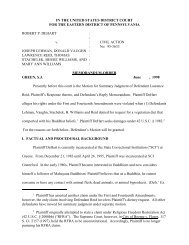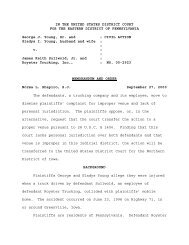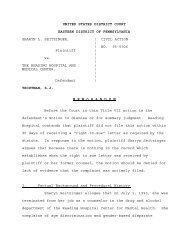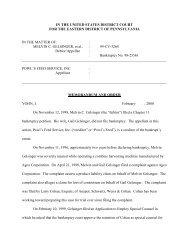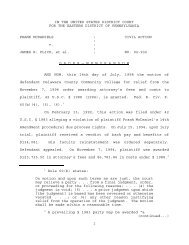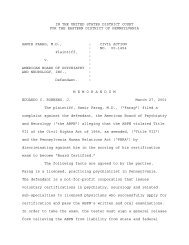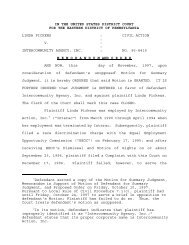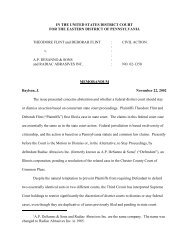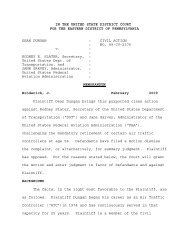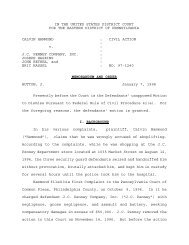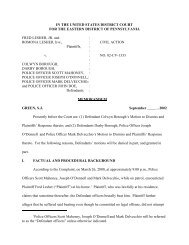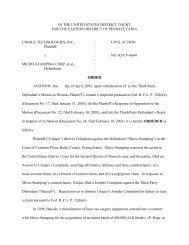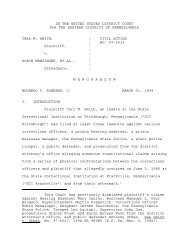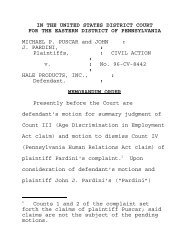1 In considering a motion to dismiss for failure to state a claim under ...
1 In considering a motion to dismiss for failure to state a claim under ...
1 In considering a motion to dismiss for failure to state a claim under ...
Create successful ePaper yourself
Turn your PDF publications into a flip-book with our unique Google optimized e-Paper software.
of federal and <strong>state</strong> statutes 2 and <strong>state</strong> common law. 3 Many of<br />
these <strong>claim</strong>s sound in wrongful collection <strong>under</strong> 26 U.S.C. §7433<br />
and must be <strong>dismiss</strong>ed, as a matter of law, <strong>for</strong> <strong>failure</strong> <strong>to</strong> <strong>state</strong> a<br />
<strong>claim</strong> upon which relief can be granted. Fed.R.Civ.P. 12 (b)(6).<br />
Others sound in <strong>to</strong>rt. Here, because of the sovereign immunity of<br />
the United States, subject matter jurisdiction is lacking, which<br />
necessitates <strong>dismiss</strong>al. Fed.R.Civ.P. 12(b)(1). The remaining<br />
<strong>claim</strong>s<br />
either fail <strong>to</strong> <strong>state</strong> a <strong>claim</strong> upon which relief could be<br />
granted, Fed.R.Civ.P. 12(b)(6), or do not properly invoke subject<br />
matter jurisdiction. Fed.R.Civ.P. 12(b)(1). These <strong>claim</strong>s must<br />
also be <strong>dismiss</strong>ed.<br />
1. Wrongful Collection Claims<br />
For the years 1991-1993, the IRS is charged with reckless<br />
or intentional violations of the tax code in the course of<br />
collection ef<strong>for</strong>ts against plaintiff. 4<br />
Specifically, it is alleged<br />
2 Claims are asserted <strong>under</strong> the following substantive<br />
provisions: 5 U.S.C. §552a; 8 U.S.C. §1512; 15 U.S.C. §1692; 26<br />
U.S.C. §§ 6012, 6213, 7430, 7433; 28 U.S.C. §2674; and 37 Pa.C.S.<br />
§303. <strong>In</strong> a suit against the IRS, a taxpayer must show “an<br />
explicit waiver of sovereign immunity.” Lonsdale v. United<br />
States, 919 F.2d 1440, 1443-44 (10th Cir. 1990). Subject matter<br />
jurisdiction is <strong>claim</strong>ed <strong>under</strong> these substantive statutes, as well<br />
as <strong>under</strong> 28 U.S.C. §§1331, 1340, 1346, 1356, 1361, and 1367.<br />
None of these jurisdictional statutes waives sovereign immunity,<br />
however.<br />
3 The essential averments are that IRS conduct<br />
constituted common law negligence, intentional <strong>to</strong>rt, and<br />
harassment.<br />
4 It is not disputed that plaintiff’s <strong>claim</strong>s were<br />
presented <strong>to</strong> and denied by the IRS, Am. compl. 7. There<strong>for</strong>e,<br />
<strong>under</strong> 26 U.S.C. §7433(d)(3), plaintiff has exhausted available<br />
administrative remedies with respect <strong>to</strong> wrongful collection<br />
<strong>claim</strong>s.<br />
2



